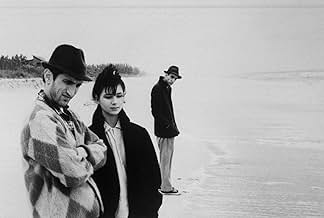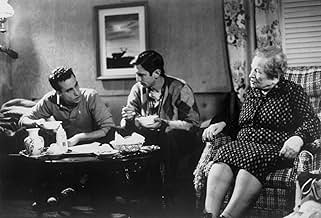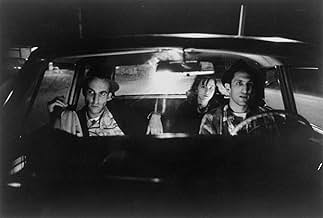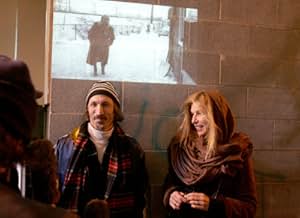IMDb-BEWERTUNG
7,4/10
42.280
IHRE BEWERTUNG
Das Leben eines New Yorkers gerät ins Wanken, als ihn seine jüngere Cousine überraschend besucht und ein seltsames, unvorhersehbares Abenteuer beginnt.Das Leben eines New Yorkers gerät ins Wanken, als ihn seine jüngere Cousine überraschend besucht und ein seltsames, unvorhersehbares Abenteuer beginnt.Das Leben eines New Yorkers gerät ins Wanken, als ihn seine jüngere Cousine überraschend besucht und ein seltsames, unvorhersehbares Abenteuer beginnt.
- Auszeichnungen
- 8 Gewinne & 2 Nominierungen insgesamt
Empfohlene Bewertungen
Reading over the comments so far, it seems that most people think this film is great, with a rare few criticizing it for being a boring 'student-film'.
People, this is for sure not a film for those who've been brutalized by too much Hollywood cinema - it's a quiet movie that you absorb slowly. It's very well done and quite absorbing. Sure it makes me think of so-called student-films (my brother is in film school), but that's not to say it's not a damn good one. There's something to be said for beautiful photography (the black and white images go so well with the feelings of emptiness and coldness) and the search for a meaning in life. These people are desperately in need of meaning and affection, none of which they seem to be able to find - or give. This is a movie about that desperate search.
And it's well worth seeing - for those with a bit of patience and artistic sensibility. It's a movie about emptiness for sure, but is by no means 'boring'. I'd give it 4/5 stars.
People, this is for sure not a film for those who've been brutalized by too much Hollywood cinema - it's a quiet movie that you absorb slowly. It's very well done and quite absorbing. Sure it makes me think of so-called student-films (my brother is in film school), but that's not to say it's not a damn good one. There's something to be said for beautiful photography (the black and white images go so well with the feelings of emptiness and coldness) and the search for a meaning in life. These people are desperately in need of meaning and affection, none of which they seem to be able to find - or give. This is a movie about that desperate search.
And it's well worth seeing - for those with a bit of patience and artistic sensibility. It's a movie about emptiness for sure, but is by no means 'boring'. I'd give it 4/5 stars.
Odd and inspiring. This film rings true with rich detail in its depictions of utter loneliness. Smoking many Chesterfields, watching television, playing solitaire, visiting Aunt Lottie, sightseeing at Lake Erie (for God's sake). It alters from tragic to comic from almost moment to moment, and often has a foot in both pools.
Jarmusch is minimalist to the core with this one, and yet manages to pull off a solid story. A small black and white gem that deserves a larger audience.
Jarmusch is minimalist to the core with this one, and yet manages to pull off a solid story. A small black and white gem that deserves a larger audience.
"Stranger than Paradise" (1984): Jim Jarmusch's first film. Often listed as a "comedy" and yes, I suppose there ARE a few oddly funny moments for the most part I find it an intensely bleak film, empty of almost all life but for a few lone cruiser characters who are detached from everyone else. The photography is astoundingly beautiful black & white. They are almost shot as individual stills with minor movements in them, and divided by blatant black divisions, which one can think of as the black pages of an old photo album. The velvety rich blacks, grays, and whites, plus the composed "still" scenes, cause me to think Jarmusch was trained as a static, 2-D artist first. Just a guess. This film is NOT about acting, which is limited at best, but doesn't really need much. We observe an alienated set of scenarios which are only enhanced by the stiff, awkward exchanges and pauses of the characters, and the lack of movement in the camera work. Ambient sound adds to the gritty reality of emptiness. Funny or not, this is a low-key, lost-souls story of detachment and aimlessness.
The New World: The teenager Eva Molnar (Eszter Balint) arrives from Budapest, Hungary, and goes to the house of his cousin Willie, a.k.a. Bela Molnar (John Lurie) in a dangerous neighborhood in New York. Eva intends to travel to Cleveland to stay with her Aunt Lotte (Cecillia Stark), but the old woman is in the hospital and Eva has to stay with the idle Wille, who is absolutely indifferent to her. They spend their empty days smoking Chesterfield, watching television and playing solitaire and Eva befriends Willie's friend Eddie (Richard Edson). Then Willie and Eddie are connected to Eva and they miss her when she travels to Cleveland.
One Year Later: Willie and Eddie win a large amount in the poker game and they borrow a car and travel to Cleveland to visit Eva. They spend a couple of boring days in the house of Aunt Lotte.
Paradise: Willie and Eddie invite Eva to go on vacation in Florida. However they lose their money in the dog racing. Willie decides to bet their last money in the horse racing and they win money. Meanwhile Eva is wrongly taken by another woman and receives a large amount from a stranger. She leaves money for Willie and Eddie and goes to the airport expecting to travel to Europe, but there is only one flight to Budapest. Meanwhile Willie and Eddie seek her out in the airport. Will Willie find Eva?
"Stranger than Paradise" is an ironic and weird tale of emptiness and boredom by Jim Jarmusch, filmed in black and white and divided in three segments (acts). There are funny moments, like for example, when Willie has a phone conversation with his Aunt Lotte and tells that Eva will put his life on hold since the guy spends the days smoking, watching television, playing solitaire and gambling in the horse racing. Then he misses Eva, probably the only different thing that had happened in his boring and empty life. In the end, it is hilarious when Eddie asks to himself: What will Willie do in Budapest? "Stranger than Paradise" is not for every audience but those viewers that also enjoy cinema as art. My vote is eight.
Title (Brazil): "Estranhos no Paraíso" ("Stranger in the Paradise")
One Year Later: Willie and Eddie win a large amount in the poker game and they borrow a car and travel to Cleveland to visit Eva. They spend a couple of boring days in the house of Aunt Lotte.
Paradise: Willie and Eddie invite Eva to go on vacation in Florida. However they lose their money in the dog racing. Willie decides to bet their last money in the horse racing and they win money. Meanwhile Eva is wrongly taken by another woman and receives a large amount from a stranger. She leaves money for Willie and Eddie and goes to the airport expecting to travel to Europe, but there is only one flight to Budapest. Meanwhile Willie and Eddie seek her out in the airport. Will Willie find Eva?
"Stranger than Paradise" is an ironic and weird tale of emptiness and boredom by Jim Jarmusch, filmed in black and white and divided in three segments (acts). There are funny moments, like for example, when Willie has a phone conversation with his Aunt Lotte and tells that Eva will put his life on hold since the guy spends the days smoking, watching television, playing solitaire and gambling in the horse racing. Then he misses Eva, probably the only different thing that had happened in his boring and empty life. In the end, it is hilarious when Eddie asks to himself: What will Willie do in Budapest? "Stranger than Paradise" is not for every audience but those viewers that also enjoy cinema as art. My vote is eight.
Title (Brazil): "Estranhos no Paraíso" ("Stranger in the Paradise")
10romper-2
I just finished watching Stranger Than Paradise on DVD - the first time I'd seen it since its year of release. I'd always recalled the film with fondness, although I could never remember why I liked it. Several years after seeing the movie I came across the John Lurie soundtrack and bought it without stopping to listen, and been slightly taken aback by it. The haunting pieces were more emotionally esoteric than I expected, and it took some time for the album to grow on me.
Seeing the movie again, I understand why. The only piece of popular music in the film is Screamin' Jay Hawkin's "I Put a Spell on You" and, although I had forgotten that it was there, I guess that I had expected the soundtrack to be more like those of mainstream movies and have songs and such-like. I think that Lurie's music is perfect in situ and, as I've said, the soundtrack has also grown on me as standalone pieces.
The movie itself is a masterpiece. The black and white images present a starkness and a clarity that heightens the alienation of self in a land that was supposed to be the new hope for immigrants from a decaying old world. Instead we see Eva walking through a deserted ghost world of New York where the graffiti says "Yankee go home". America is only a dream, a collective vision of a better world; paradise somewhere on earth.
As Willie and Eddie journey west after winning some money, we see that the supposedly beautiful city of Cleveland is cold and desolate with a frozen lake. The further trip to Florida ends in the middle of nowhere next to a bleak and windswept ocean. Paradise is still somewhere out of reach. I think that's why the movie appeals to me. It shows that the America of popular mythology - the home of the brave, land of the free, protector of the downtrodden, guardian of democracy in the free world - is merely a construct. Too many people these days believe in the child's fantasy of America being some paradise that Iraq and Afghanistan should emulate. Jarmusch reminds us that it is people who give meaning to a symbol, not the other way around. He allows for the ability of people to make their own meanings and evolve beyond the stagnation of popular culture.
At a time I originally saw this movie I had recently left home and got my first job, moving from the country to the city, and maybe to some extent I identified with Eva - moving from Budapest to America. It was also my first taste of grownup film, if I recall correctly, and confirmed me with a lifelong fascination with the cinema. I have a lot to thank Jim Jarmusch for.
Seeing the movie again, I understand why. The only piece of popular music in the film is Screamin' Jay Hawkin's "I Put a Spell on You" and, although I had forgotten that it was there, I guess that I had expected the soundtrack to be more like those of mainstream movies and have songs and such-like. I think that Lurie's music is perfect in situ and, as I've said, the soundtrack has also grown on me as standalone pieces.
The movie itself is a masterpiece. The black and white images present a starkness and a clarity that heightens the alienation of self in a land that was supposed to be the new hope for immigrants from a decaying old world. Instead we see Eva walking through a deserted ghost world of New York where the graffiti says "Yankee go home". America is only a dream, a collective vision of a better world; paradise somewhere on earth.
As Willie and Eddie journey west after winning some money, we see that the supposedly beautiful city of Cleveland is cold and desolate with a frozen lake. The further trip to Florida ends in the middle of nowhere next to a bleak and windswept ocean. Paradise is still somewhere out of reach. I think that's why the movie appeals to me. It shows that the America of popular mythology - the home of the brave, land of the free, protector of the downtrodden, guardian of democracy in the free world - is merely a construct. Too many people these days believe in the child's fantasy of America being some paradise that Iraq and Afghanistan should emulate. Jarmusch reminds us that it is people who give meaning to a symbol, not the other way around. He allows for the ability of people to make their own meanings and evolve beyond the stagnation of popular culture.
At a time I originally saw this movie I had recently left home and got my first job, moving from the country to the city, and maybe to some extent I identified with Eva - moving from Budapest to America. It was also my first taste of grownup film, if I recall correctly, and confirmed me with a lifelong fascination with the cinema. I have a lot to thank Jim Jarmusch for.
Wusstest du schon
- WissenswertesDirector Jim Jarmusch was dismayed to discover all the money he paid for the rights to Screamin' Jay Hawkins' "I Put a Spell on You" went to the record company, with nothing going to Hawkins himself. When the film earned a profit, Jarmusch took it upon himself to track down Hawkins (who was living in a trailer park, at the time) and give him some money. It was the beginning of a friendship that lasted until Hawkins' death. According to Jarmusch, Hawkins continuously swore he'd pay him back, despite Jarmusch's insistence that the money was a gift.
- PatzerWhen Eddie and Willie are driving to Cleveland, the camera and camera operator can be seen in the reflection of the rear view mirror.
- VerbindungenEdited from Stranger than Paradise (1983)
- SoundtracksI Put a Spell on You
Written by Screamin' Jay Hawkins (as Jay Hawkins)
Used by permission of CBS Unart Catalog, Inc.
All Rights Reserved.
Performed by Screamin' Jay Hawkins
Courtesy of CBS Records
Top-Auswahl
Melde dich zum Bewerten an und greife auf die Watchlist für personalisierte Empfehlungen zu.
- How long is Stranger Than Paradise?Powered by Alexa
Details
- Erscheinungsdatum
- Herkunftsländer
- Sprachen
- Auch bekannt als
- Stranger Than Paradise
- Drehorte
- 464 Newark St, Hoboken, New Jersey, USA(Corner building when Eva first arrives and walks to apartment)
- Produktionsfirmen
- Weitere beteiligte Unternehmen bei IMDbPro anzeigen
Box Office
- Budget
- 90.000 $ (geschätzt)
- Bruttoertrag in den USA und Kanada
- 2.436.000 $
- Weltweiter Bruttoertrag
- 2.454.393 $
- Laufzeit1 Stunde 29 Minuten
- Farbe
- Seitenverhältnis
- 1.85 : 1
Zu dieser Seite beitragen
Bearbeitung vorschlagen oder fehlenden Inhalt hinzufügen

Oberste Lücke
By what name was Stranger than Paradise (1984) officially released in India in English?
Antwort




























